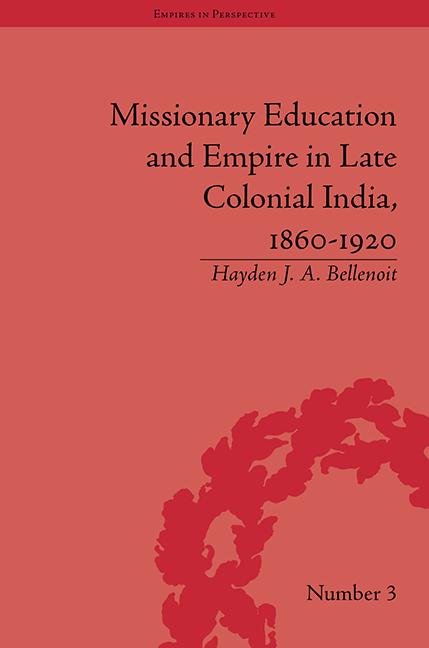Book contents
- Frontmatter
- CONTENTS
- List of Tables
- Acknowledgments
- Glossary
- List of Abbreviations
- Introduction
- 1 Knowledge, Religion and Education in Early Modern India
- 2 British Fears and Indian Society in the Emergence of North Indian Education, c. 1860–1920
- 3 Between East and West: Orientalism, Representations of and Engagements with India
- 4 The Failures of Education and its Sociological Bearings
- 5 Religious Interaction, the Curriculum and Indian Contestations of Late Colonial Knowledge
- 6 Maintaining Missionary Influence: Nationalism, Politics and the Raj c. 1870–1920
- Conclusion
- Notes
- Works Cited
- Index
5 - Religious Interaction, the Curriculum and Indian Contestations of Late Colonial Knowledge
- Frontmatter
- CONTENTS
- List of Tables
- Acknowledgments
- Glossary
- List of Abbreviations
- Introduction
- 1 Knowledge, Religion and Education in Early Modern India
- 2 British Fears and Indian Society in the Emergence of North Indian Education, c. 1860–1920
- 3 Between East and West: Orientalism, Representations of and Engagements with India
- 4 The Failures of Education and its Sociological Bearings
- 5 Religious Interaction, the Curriculum and Indian Contestations of Late Colonial Knowledge
- 6 Maintaining Missionary Influence: Nationalism, Politics and the Raj c. 1870–1920
- Conclusion
- Notes
- Works Cited
- Index
Summary
During the nineteenth century, European scholars and missionaries often presumed that English education and Christianity were formative formulae in the creation of a modern, secular, English-speaking Indian middle class and political elite. One underlying assumption was that the experience of English education enacted significant, transforming change upon Indian religious beliefs and that it washed away the superstition of the Puranas and Hindu legend. This chapter, by contrast, takes a much more cautious approach to this claim. So far this book has laid the framework and context of the educational enterprise by examining the wider functioning of education and its infrastructural weaknesses. This chapter will get more specific and take the analysis to the classroom and curricula. Firstly, it will explore the scholarly engagements with Hinduism by Christian missionaries and Orientalist scholars, and outline how they both attempted to draw historical connections between Christianity and Hinduism. The explicitly stated need for religious and spiritual discussion along the lines of Fulfilment led teachers and headmasters to study comparative religion and exchange sacred knowledge with pundits, moulvies and sannayasis in bazaars, mountain retreats and school corridors. This process was, at the same time, ultimately bound up with the relationship between western secular knowledge and Christianity. The second part of this chapter will then proceed to analyse the actual impact of the curricula upon the religiosity of students, saints and scholars. In doing so, it will explore how Indians contested the more hegemonic pretensions of education and colonial knowledge. At first glance, the impartation of western knowledge via the network of mission schools in north India was a striking example of the penetrating reach of colonialism into the Gangetic hinterland. Students encountered a curricula and knowledge system which had the potential to complicate their ‘traditional’ religious beliefs, cosmological sanctity and sacred geography. Indeed, some scholars have argued that western knowledge served as a mask in unseating ‘irrational’ and ‘superstitious’ Indian beliefs.
- Type
- Chapter
- Information
- Publisher: Pickering & ChattoFirst published in: 2014



